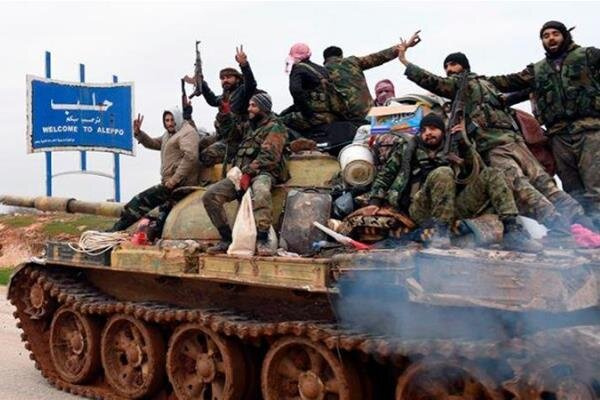10th anniversary of war against Syria; Challenges, achievements

It has passed 9 years of crisis and war in Syria Since March 2011. At first, the crisis seemed to be a political demand under the influence of the Arab revolutions in the Middle East and North Africa. Therefore, some opposition political sides joined the protests.
The crisis in Syria began in March with demonstrations in some parts of the country. Domestic currents and some that sought a political change to complete the Arab revolutions' chain in Syria, but these protests and political opposition to the Bashar al-Assad government soon ended in military conflict.
Subsequent events in Syria proved that not only what happened in the country did not have any traits of the Arab revolutions, but all in line with the simulation of revolutions in North African. In fact, it was the American, Israeli, and Saudi joint think-tanks' political exploitation of events that they were trying to describe as the Arab Revolutions or the Arab Spring.
The Arab revolutions were a good opportunity to harm one of the pillars of the Resistance in the region and to create tribal conflicts in order to reduce Iran's power and provide security for the region surrounding the Zionist regime. US assessments and Western intelligence agencies also suggested that the Syrian issue would be over in the early months.
It was the same instruction that was previously intended to target the Islamic Resistance forces in the region to pave the way for Iran's defeat. With the exception of political actors such as Turkey and some Arab countries such as Qatar, which sought to seize the opportunity to play an active role in the region and subsequently gain political privilege, Saudi Arabia with its financial and military support played an active role in soaring the tensions in Syria. In particular, the Saudis felt that they were not capable of influencing to change the rules of the game, and on the other hand, they needed to influence the developments to change Syria's ruling structure.
Turkey, meanwhile, did not pull back and tried to gain political advantage from these conditions. It should be noted, however, that Turkey does not follow a firm strategic policy under Erdogan and changes its behaviors based on his party's political interests. The changes in Erdogan's Political approach in Syria's developments and many other developments in the West Asian region could be attributed to these instances of volatile and unstable behaviors.
More than 250 terrorist groups in Syria were active against Bashar al-Assad government and at the beginning of the crisis, the terrorist groups even reached as far as Bashar al-Assad's palaces in Damascus.
Of course, the main differences between the protests and the military conflict in Syria with the rest of the Arab countries was important in several respects. First, the protests in Syria started from the border zones and did not engulf the capital. Secondly, the protests have not anti-Israeli and anti-US motivations. Thirdly, more than 80 percent of these groups were imported from outside the Syrian borders, with more than 10000 European terrorists dubbed blue-eyed terrorists.
On the other hand, Saudi Arabia, as the godfather of Wahhabism and ISIL, also played the role of the intellectual father for these terrorist groups in addition to political and financial support.
Qataris were also at the forefront of media support for the terrorists present in Syria, especially as the Al Jazeera channel officially served as the official tribune of ISIS and Al-Nusra and other terrorist groups.
Perhaps this media support caused that ISIL is described as a powerful terrorist group in the media arena. The consensus of the Saudis, Qataris, the US, Turkey, and the Zionist regime paved the way for an all-out war against Syria, which has claimed some 400000 lives so far, most of them civilians, mostly beheaded by ISIL and the Al-Nusra Front.
Meanwhile, even some Palestinian groups had fallen into the trap of cutting ties with Syria, but gradually reformed their approach. Today, as the crisis has entered its tenth year, most infrastructures, schools, and clinics have been destroyed.
Syria, however, has also gained significant achievements in the military field, much of which is due to Islamic Resistance forces in Tehran's support zone. The creation of new models of combating, using the Islamic Republic of Iran's patterns and trust in the discourse of the Islamic Resistance were the most important elements in completing the victory chain in Syria.
The Syrian army holds all its territories except some parts of Idlib, and terrorist groups have been expelled or defeated. Terrorist groups owe their presence in a small part of Syria's territory to US support and Turkish interventions.
Politically, Syria has maintained and strengthened its political legitimacy, something that Westerners have been concerned about since the beginning, as they have repeatedly stated that Syria would be more powerful once the country overcomes the crisis.
In the midst of the Syrian crisis, many Arab countries, such as Qatar, have returned to Syria, and some have reopened their embassies.
The Axis of Resistance has passed a successful though difficult experimental, and Political field experience and has recovered its military and field balance. The role of the Axis of Resistance forces, especially Hezbollah, in providing new field experiences to overcome this crisis should not be overlooked.
Source: Mehr

